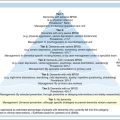Chapter 27 COMMUNITY MANAGEMENT OF ACUTELY ILL OLDER PEOPLE
INTRODUCTION
This brief chapter introduces some of the issues confronting mental health workers when dealing with acutely ill older people. Because older people have more general medical health problems than younger people, and are more prone to experience adverse effects when treated with psychotropic medication, the management of acute mental illness in the community can pose some challenges. Very little has been published on this topic, so this chapter is a distillation of the authors’ experience.
MEDICAL ISSUES
Although community mental health teams are not usually responsible for providing primary healthcare to older people with mental health problems, they nevertheless are often in a good position to identify acute deteriorations in their an older person’s physical health. Common acute problems encountered in older people during domiciliary visits include falls and confusion. When such problems are identified, and are an immediate risk to the person’s health, the community mental health team has an ethical obligation to take action. However, the management of general medical problems in older people with mental health problems will sometimes require the approval of a substitute decision maker, such as a statutory health attorney, an attorney for health matters under an enduring power, or the local guardianship authority.
Stay updated, free articles. Join our Telegram channel

Full access? Get Clinical Tree





